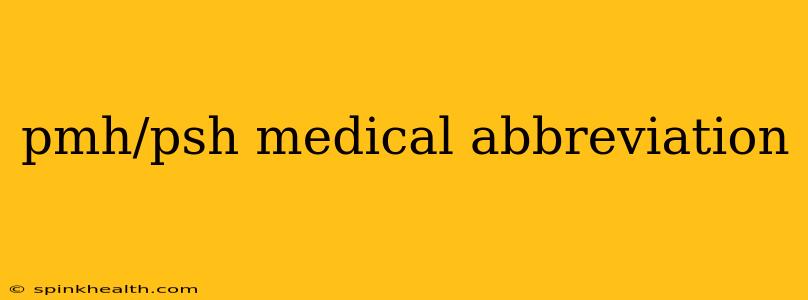Unraveling the Mystery: PMH vs. PSH Medical Abbreviations
Have you ever encountered the medical abbreviations PMH and PSH in a patient's chart or medical record? These seemingly similar abbreviations can be confusing, even for healthcare professionals. Let's dive into their meanings and explore the subtle yet crucial differences. This isn't just about deciphering codes; it's about understanding the vital information these abbreviations convey and ensuring patient safety.
My name is Dr. Evelyn Reed, and I've been practicing internal medicine for over 15 years. I've seen firsthand the impact of clear communication in healthcare, and that includes a precise understanding of medical shorthand. This post will aim to clarify any confusion surrounding PMH and PSH.
What does PMH stand for in medical terms?
PMH stands for Past Medical History. This is a crucial part of a patient's record, detailing previous illnesses, injuries, surgeries, and treatments. Think of it as a comprehensive timeline of a person's health journey. It’s not just a list; it provides context for current symptoms and helps clinicians make informed decisions. A thorough PMH might include:
- Significant illnesses: Such as heart attacks, strokes, cancer, diabetes, asthma, etc.
- Surgeries: Including dates, types of procedures, and outcomes.
- Hospitalizations: Reasons for admission and length of stay.
- Allergies: To medications, food, or environmental substances.
- Immunizations: A record of vaccinations received.
- Current medications: A list of all prescribed and over-the-counter drugs.
A well-documented PMH is essential for coordinating care, preventing adverse drug reactions, and making informed treatment choices.
What does PSH stand for in medical terms?
PSH is less commonly used than PMH, and its meaning can vary slightly depending on the context. Most frequently, it stands for Past Surgical History. This is a more focused aspect of the past medical history, concentrating solely on previous surgical interventions.
This section of the medical record would detail specifics about any operations the patient has undergone, such as:
- Type of surgery: e.g., appendectomy, coronary artery bypass graft (CABG), hysterectomy.
- Date of surgery: Providing a timeline for the procedure.
- Hospital or clinic where the surgery was performed: For reference and potential record retrieval.
- Surgeon’s name: For identifying the responsible physician.
- Outcome of the surgery: Success, complications, etc.
While PSH is often included within the broader PMH, sometimes it's listed separately for quicker access to crucial surgical information.
What is the difference between PMH and PSH?
The key difference lies in their scope. PMH is comprehensive, encompassing all past health events. PSH is specific, focusing only on past surgical procedures. You could consider PSH as a subset of the larger PMH.
Is there any other meaning for PSH?
Although less common, in some specialized medical fields, PSH might have other meanings. It's crucial to consider the context in which the abbreviation is used. Always check the surrounding information to clarify its intended meaning. If uncertain, consult with a medical professional.
Why is it important to accurately record PMH and PSH?
Accurate documentation of PMH and PSH is critical for several reasons:
- Improved Patient Care: Provides clinicians with essential information for diagnosis and treatment planning.
- Reduced Medical Errors: Helps prevent adverse drug reactions and other complications.
- Enhanced Communication: Facilitates seamless communication between healthcare providers.
- Better Coordination of Care: Allows for effective care coordination among different specialists.
In conclusion, understanding the difference between PMH and PSH is vital for effective healthcare communication and patient safety. While PMH offers a broad overview of a patient's past health, PSH focuses specifically on past surgical interventions. Always remember to consider the context and, when in doubt, seek clarification from a medical professional.

